

Risky Play: Why Children Love It and Need It. Source: article continues after advertisement Fear, you would think, is a negative experience to be avoided whenever possible.
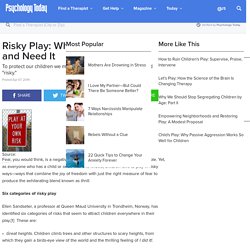
Yet, as everyone who has a child or once was one knows, children love to play in risky ways—ways that combine the joy of freedom with just the right measure of fear to produce the exhilarating blend known as thrill. Six categories of risky play Ellen Sandseter, a professor at Queen Maud University in Trondheim, Norway, has identified six categories of risks that seem to attract children everywhere in their play.[1] These are: • Great heights. . • Rapid speeds. . • Dangerous tools. . • Dangerous elements. . • Rough and tumble. . • Disappearing/getting lost.
The evolutionary value of risky play Other young mammals also enjoy risky play.[2] Goat kids frolic along steep slopes and leap awkwardly into the air in ways that make landing difficult. From an evolutionary perspective, the obvious question about risky play is this: Why does it exist? Briefly, the evidence is this. How to Protect Your Children from Momo – it’s simpler than you think.
Should you pick your baby up every time it cries? New study says ‘yes’ ANYONE have an annoying mother-in-law/husband/girlfriend who berates them for “spoiling” their baby by picking them up every time they cry?
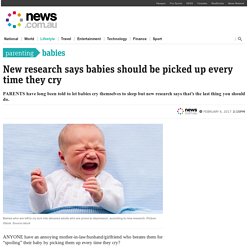
Well, now you can tell them your instincts were right all along. New research has found that cuddled children grow up to be healthier, less depressed, kinder, more empathetic, and more productive adults. Prof Narvaez said the research showed it was “impossible” to “spoil” infants with cuddles and that letting them cry can “ruin” their development. And the younger they receive it, the better, according to Professor Darcia Narvaez of the University of Notre Dame’s Department of Psychology.
Food Habits. Baby Care Advice. 4 Signs Your Baby Is Ready for Solid Foods. My last post went into great detail about the research on age of starting solids and health outcomes, including nutrition, growth, illness, and allergies.
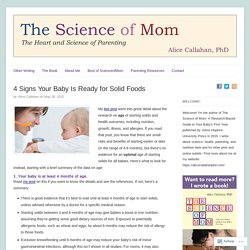
If you read that post, you know that there are small risks and benefits of starting earlier or later (in the range of 4-6 months), but there’s no evidence for an optimal age of starting solids for all babies. Here’s what to look for instead, starting with a brief summary of the data on age: Read my post on this if you want to know the details and see the references.
If not, here’s a summary: S.I.T.! Feeding Your Child Using Stability and Independence at the Table. (Guest Post by Melanie Potock) Here on Science of Mom, we’ve been discussed starting solid foods over the last few posts.
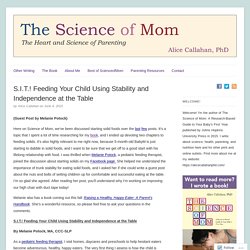
It’s a topic that I spent a lot of time researching for my book, and I ended up devoting two chapters to feeding solids. It’s also highly relevant to me right now, because 5-month-old BabyM is just starting to dabble in solid foods, and I want to be sure that we get off to a good start with his lifelong relationship with food. I was thrilled when Melanie Potock, a pediatric feeding therapist, joined the discussion about starting solids on my Facebook page. Starting Solids: 4 Months, 6 Months, or Somewhere In Between? Science of Mom reader Roxanne left a comment on my post about the recent peanut allergy study.
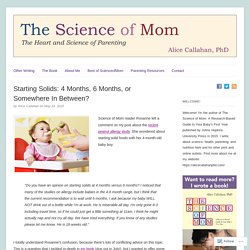
She wondered about starting solid foods with her 4-month-old baby boy: “Do you have an opinion on starting solids at 4 months versus 6 months? I noticed that many of the studies on allergy include babies in the 4-6 month range, but I think that the current recommendation is to wait until 6 months. The scary truth about what's hurting our kids - Your Modern Family. In the past week, I’ve read several studies that are scary to me… the scary truth about what’s hurting our kids. We all know that what our kids hear becomes their inner voice, but it’s hard to control what they hear from others, isn’t it? CNN recently interviewed Dr Jean Twenge, author of iGen and her interview really worried me – because I saw the truth that I would be facing in just a few short years.
Dr. Twenge started doing research 25 years ago on generational differences, but when 2011 -2012 hit, she saw something that would scared her to the core. This is the year when those having iPhones went over the 50% mark. Five Reasons You Have to Stop Excusing Verbal Abuse. The Hardest Part Of Parenting Isn't What I Expected. Scary strangers, children, and boundary setting in the grocery store. Today I’m thinking about an important question that I found in a private group on Facebook.

Shared with permission and with names obscured, here’s the backstory: To answer the first question you’re most likely to ask after reading the above: Yes, this incident really did happen. Talking to Boys the Way We Talk to Girls - NYTimes.com. How to Connect With Your Child: The Magic of the 5:1 Ratio. Inside: After a negative interaction with your child, it’s hard to see how to connect with your child and close the gap.

Which is why you need the magic 5:1 ratio. Yesterday, a library book ruined my day. How To Help Your Child With Anger. When our kids get angry, it pushes buttons for most of us.
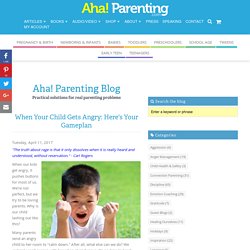
Here's what to remember. "The truth about rage is that it only dissolves when it is really heard and understood, without reservation. " - Carl Rogers. Healthyway. When we added a third child to our family, I was overwhelmed by the workload of caring for three kids under the age of 5.
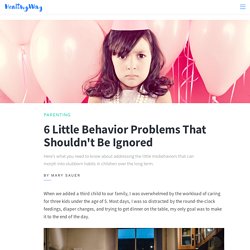
Most days, I was so distracted by the round-the-clock feedings, diaper changes, and trying to get dinner on the table, my only goal was to make it to the end of the day. I hate to admit it, but during that season of survival, I found myself turning a blind eye to little misbehaviors from my toddlers on a regular basis. It seemed easier at the time to just pick up the blocks myself instead of engaging in a full-on toddler battle again and again.
The reality is, I paid for it in the long run. Now that my third is becoming a little more independent, I am finding myself working double time trying to teach my daughters to do what they’re asked and to be kind to the other members of our family. Why Kids Need Minimalism. Www.rodalesorganiclife. This is actually great news.
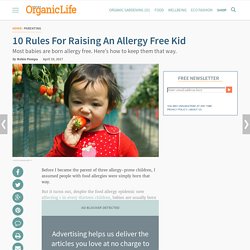
It lends parents some control over allergy development. It won't work for everyone, but by altering our babies' experiences, we can now significantly minimize the risk of food allergies. SuperBabies Don’t Cry. When I was pregnant, I tried to make a SuperBaby. I did not realize I was doing this. I believed I’d long ago shed the theory that a body could be made perfect. But looking back, my goal was clear. I ate 100 grams of protein a day.
#sthash.yA0Cx6Dt.pRIgT657. Yes, My Kid Is Too Young To Remember, But We Are Taking The Trip Anyway. Why Kids Benefit From Fewer Toys. The renowned child educator, Maria Montessori, said “Play is the child’s work.” She meant that children are working when they play. Play is an important part of child development, and the types of toys that a child interacts with shapes their understanding of the world around them. Toys are the tools children use to accomplish their work, but it is best to limit the number of toys. The important role of aunts and uncles in children’s lives. By Monica Leftwich By Monica Leftwich On Parenting Perspective Perspective Discussion of news topics with a point of view, including narratives by individuals regarding their own experiences. The silent tragedy affecting today’s children — Victoria Prooday. How much more evidence do we need before we wake up?
No, “increased diagnostics alone” is not the answer! No, “they all are just born like this” is not the answer! No, “it is all the school system’s fault” is not the answer! Yes, as painful as it can be to admit, in many cases, WE, parents, are the answer to many of our kids’ struggles! Early bedtime may mean better mental health for mom: study. How to Respond When Your Child is Disrespectful. Kids Should Play Outside 3 (!) Hours Every Day, This Expert Says. Here’s Why — And How To Do It. You can’t love too much: Attachment doesn’t slow growth, it fuels it - Motherly. 13 Moms Share the Best Advice They’ve Gotten From Another Mom – P&G everyday. Pretending to Understand What Babies Say Can Make Them Smarter - The Atlantic. A few weeks ago, I was eating lunch with my family at a pancake house when a small blond head popped over the top of the booth next to ours.
Somewhere in the ballpark of a year old, the boy said something unintelligible—maybe baby babbling, maybe real words muffled by pancake—and gave a high-pitched giggle. He waved a tiny-syrup smeared arm in my direction. “He’s such a flirt,” his mother said apologetically. “He is,” cooed my own mother, who can befriend anything that will stand still long enough. How to Talk to Your Baby (0 to 2 Years): An Expert's Guide. Your brain is particularly vulnerable to trauma at two distinct ages — Quartz. Our brain’s ability to process information and adapt effectively is dependent on a number of factors, including genes, nutrition, and life experiences. These life experiences wield particular influence over the brain during a few sensitive periods when our most important muscle is most likely to undergo physical, chemical, and functional remodeling.
According to Tara Swart, a neuroscientist and senior lecturer at MIT, your “terrible twos” and those turbulent teen years are when the brain’s wiring is most malleable. As a result, traumatic experiences that occur during these time periods can alter brain activity and ultimately change gene expressions—sometimes for good. The “terrible twos” Throughout the first two years of life, the brain develops at a rapid pace. Learning and understanding a new language forces your brain to work in new ways, connecting neurons and forming new pathways.
How Parents Who Yell Affect Their Child's Development. With the exception of umpires, NASCAR pit crews, and political radio jocks, being a parent is one of the few occupations where yelling feels mandatory. The question isn’t why parents yell — there are myriad reasons — but what effect it’s having on children. And the growing scientific consensus is that yelling or scolding makes them more aggressive, more anxious. According to Dr. Laura Markham, founder of Aha! Parenting and author of Peaceful Parent, Happy Kids: How to Stop Yelling and Start Connecting, shouting is something we can do without. Fight, Flight, or Freeze Dr. Pedophile Detective Warns Parents What Predators Look for in Your Kids’ Photos. What Screen Time Does to Babies' and Children's Brains and Sensory Processing Abilities. How to raise kinder, less entitled kids (according to science)
Which Loved Best : Poem : English Poem : English. Dealing with Big Feelings - Teaching Kids How to Self-Regulate. Why kids today are out of shape, disrespectful – and in charge. 10 Insights of Remarkable Parents from a Family Therapist. How parents set their kids up for success. 15 Hilarious Hacks Every Parent Needs To Know - BabyGaga. 5 Ways To Raise A Saver, Not A Spender. AAP Media Plan. AAP announces new screen time rules for kids. How to Use Bedtime to Talk About Jesus With Your Kids. Are We Following Satan's Plan for Parenting? Tantrum Tamers: 32 Phrases to Use With 3 and 4 Year-Olds. 25 Things NOT To Say To Your Kids. FDA Warns Against Homeopathic Teething Medicines. Do no lives matter? Utah blogger offers insights on recent racial strife. Does Talking about Pornography with Your Kids “Give Them Ideas”?
Parenting . education . marriage . food. We Ask Our Kids The Same 3 Questions Every Night. Five Destructive Parenting Habits We Must Replace. How Getting Rid of My Stuff Saved My Motherhood – The Balanced Life. For U.S. Parents, a Troubling Happiness Gap. Understanding WHY – the chastity talk you *wish* you were having – Alaina Chatterley.
15 Surprising Things About Parenting in Iceland. Your Kid Is A Brat, And It's Your Fault. Shiplap and Good Intentions - Rob Porter Ph.D., LMFT. "Nurture Shock" Debunks Popular Parenting Myths. How an LDS Family with 3 Million YouTube Followers Stands for Their Faith. Family of scholars: Utah family celebrates 5th graduate from Harvard University. Research shows preschoolers who watch Daniel Tiger’s Neighborhood develop social and emotional skills – ChildrenAndMediaMan. The Life-Changing Phrase to Calm an Upset Child. Why Your Kids Need to Be Bored This Summer. Welcome to Safely Ever After, Inc. How the “Tricky People” Concept Saved My Boys. How to Stay Out of it: Conflict Resolution for Kids.
10 car seat safety tips from an expert. Some of these might surprise the most seasoned parent. How Far Apart Should You Space Your Kids? How Will God Interview Parents? The Power of Not Knowing by Liz Wiseman.
Teenagers. School Age. Babies. Why adults have to stop trying so darn hard to control how children play. Reshma Saujani: Teach girls bravery, not perfection. How I made sure all 12 of my kids could pay for college themselves. The Key to Raising Responsible Adults. Uk.businessinsider. Why Some Kids Try Harder and Some Kids Give Up. This is What Happens When Satan Steals Your Motherhood.
16 Years Ago, A Doctor Published A Study. It Was Completely Made Up, And It Made Us All Sicker. The Secret to Raising Resilient Children. Our Push for ‘Passion,’ and Why It Harms Kids. Establishing healthier habits starts with sleep. My Husband is an Idiot and I Can't Stand My Kids. Parents: You’re not doing your job. Sincerely, expert and author Leonard Sax.
Ask An Expert: How Can Mindfulness Help You Be A Better Parent. Underprivileged Kids Are Offered Two Gifts: One They Want And One Their Parents Want. They Can... 7 Low-Tech Ways to Entertain Kids in Restaurants – P&G everyday. If it feels weird to have to force your kid to hug their relatives, there's a reason. Can We Please Stop Gaslighting Our Kids? Partners Content - with Right Rail. LDS Leaders and Mental Illness - November 06, 2015.